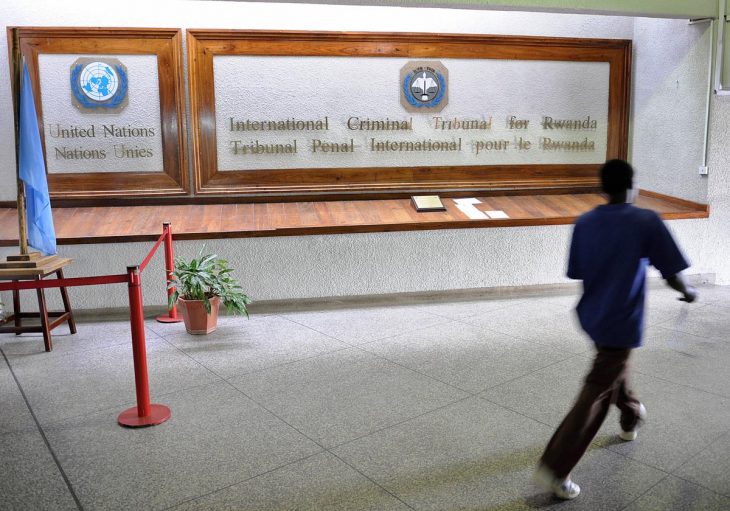After accepting two of the first acquitted persons from the International Criminal Tribunal for Rwanda (ICTR), France has rejected all subsequent requests. The reason often invoked by Paris is "a risk of disturbing public order". But for the persons concerned and their lawyers France, which is still accused not only of having played a role in the genocide but also harbouring alleged genocide perpetrators on its territory, simply does not want to attract new wrath from Kigali. Its delicate diplomatic relations with Rwanda are therefore at stake.
In his application filed on August 23, 2018, the lawyer for Nzuwonemeye - a former Rwandan battalion commander acquitted in 2014 - believed he had found a solution that would help the French authorities. Peter Robinson asked the MICT to issue a decision ordering France to open its doors to Nzuwonemeye on the grounds that at the time of his arrest in 2000, he was on French territory. The American lawyer pushed his subtle argument further. “Nzuwonemeye is not requesting the Mechanism to order France to grant him asylum or confer any particular immigration status on him. The order sought is that France take him back on its territory and put him in the same position that he was at the time of his transfer to the ICTR,” he said.
Precarious situation
The international community's commitment to impunity should not end with rendering justice to those convicted of international crimes but must necessarily accommodate those who have completed their sentences or have been acquitted of such crimes.
Robinson’s request was rejected, but he appealed. In its decision of April 17 this year, the MICT appeals chamber said it did not have the power to oblige France to give Nzuwonemeye a visa. However, it deemed that “the international community's commitment to impunity should not end with rendering justice to those convicted of international crimes but must necessarily accommodate those who have completed their sentences or have been acquitted of such crimes”.
Rwanda says its doors are wide open to former ICTR detainees, but these former leaders in the old regime say they fear for their security in their native land. In its decision the MICT recognizes “the precarious situation in which persons acquitted by the ICTR have found themselves for many years in the sense that they do not wish to return to Rwanda, their
country of origin, and that the States requested by acquitted persons are reluctant to accept individuals who have been charged with international crimes". The ICTR Statute places an obligation on States to cooperate in the arrest and transfer of accused persons, but says nothing about acquitted persons.
Acquitted but not free
With regard to Nzuwonemeye's argument that he is only asking to be resettled in the situation he was in at the time of his arrest, the judges are cautious. “The right of an acquitted person to be returned to the country where he was arrested involves issues which are beyond the scope of the jurisdiction of the Mechanism,” states the decision. The former major argues family ties, because his children have obtained French nationality. “Domestic jurisdictions or other international institutions tasked with adjudicating claims of violations of human rights must evaluate such claims in their full context and are better suited to address the issues raised by Nzuwonemeye, including alleged violations to his human right to family life,” say the judges.
Finally they make an appeal to France: “In this context, the Appeals Chamber encourages France to renew its consideration of Nzuwonemeye's request to be allowed in France under the same conditions in which he was arrested and be given the opportunity to, through the proper procedures, attempt to legalize his status in that country”. This is just a non-binding encouragement, not what Nzuwonemeye -- who has been living almost cloistered in Arusha where the MICT is based since his acquittal on appeal in 2014 – wanted.
“Some hope”
“That was a very disappointing decision in Major Nzuwonemeye's case,” said Robinson in a reaction to the decision. “I was sad that the Mechanism was unwilling to assume its legal responsibility to put an acquitted person back in the State in which it found him.” This is nevertheless the first time that such a request, which has usually been made at the United Nations by ICTR or MICT officials, has been the subject of a judicial decision. So, despite his disappointment, Robinson says there is still “some hope”. “Although the Appeals Chamber declined to order France to take Nzuwonemeye back, it urged France to take Major Nzuwonemeye back on its territory so that he could attempt to legalize his status there. Major Nzuwonemeye is now in the process of applying for a visa through the French Embassy in Dar es Salaam and hopes that the French government will honor the request of the Appeals Chamber.”
“Agreements between tribunals and States”
In a November 2015 interview with JusticeInfo.net Géraldine Mattioli-Zeltner, international justice advocacy director at Human Rights Watch, urged the international community and other international jurisdictions to learn lessons from the ICTR experience. “It is up to all States to volunteer to take these people, so they are not condemned to live in an ICTR house without any future prospects,” she said. “Taking acquitted persons or those who have served their sentences is perhaps not the most attractive part of supporting international justice but it is absolutely crucial for the respect of these people’s rights and for the credibility of the international judicial institutions who are otherwise likely to be accused of abandoning them. An important lesson to be drawn from ICTR experience is the need for agreements on this issue between the tribunals and States to be concluded as quickly as possible, before the problem emerges.”
Nzuwonemeye is confined in Arusha with Protaïs Zigiranyirazo, brother-in-law of former Rwandan President Juvénal Habyarimana, and three former ministers including André Ntagerura, who was acquitted 15 years ago. Three other former officers released after serving their sentences are in the same situation.







